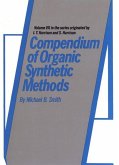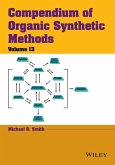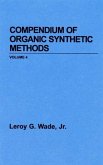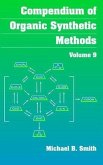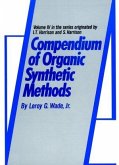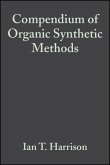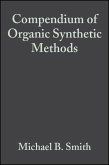More than a one-volume listing of synthetic methods, Compendium ofOrganic Synthetic Methods offers chemists a highly focused andselective look at several thousand functional grouptransformations. Used by more professionals than any comparablereference on the market, this valuable desktop resource providesquick access to the recipes of the newest, most useful reactionsand transformations. It also affords professionals an unparalleledopportunity to browse the vast body of recent literature for newreactions and transformations that may be of interest.
Featuring 1,200 more entries than its predecessor, Volume 8 coversfunctional group transformations and carbon-carbon bond formingreactions appearing in the literature from 1990 through 1992. Itpresents approximately 1,400 examples of published reactions forthe preparation of monofunctional compounds and approximately 1,640examples of reactions that prepare difunctional compounds withvarious functional groups. It also features 60 more reviews thanVolume 7.
As in all the previous Compendium volumes, the classificationschemes used allow for quick and easy reference and informationretrieval. Chemical transformations are classified first by thereacting functional group of the starting material and then by thefunctional group formed. The transformation, major reagents thateffect the transformation, yield percentage, and stereochemistryare all clearly shown. The Compendium also includes indices forboth monofunctional and difunctional compounds as an efficientmeans of guiding you to specific classes of transformations.
Compendium of Organic Synthetic Methods, Volume 8 providesprofessional chemists and students unparalleled access to thewealth of methods, reactions, and transformations in contemporaryorganic chemistry.
Featuring 1,200 more entries than its predecessor, Volume 8 coversfunctional group transformations and carbon-carbon bond formingreactions appearing in the literature from 1990 through 1992. Itpresents approximately 1,400 examples of published reactions forthe preparation of monofunctional compounds and approximately 1,640examples of reactions that prepare difunctional compounds withvarious functional groups. It also features 60 more reviews thanVolume 7.
As in all the previous Compendium volumes, the classificationschemes used allow for quick and easy reference and informationretrieval. Chemical transformations are classified first by thereacting functional group of the starting material and then by thefunctional group formed. The transformation, major reagents thateffect the transformation, yield percentage, and stereochemistryare all clearly shown. The Compendium also includes indices forboth monofunctional and difunctional compounds as an efficientmeans of guiding you to specific classes of transformations.
Compendium of Organic Synthetic Methods, Volume 8 providesprofessional chemists and students unparalleled access to thewealth of methods, reactions, and transformations in contemporaryorganic chemistry.
Dieser Download kann aus rechtlichen Gründen nur mit Rechnungsadresse in D ausgeliefert werden.



